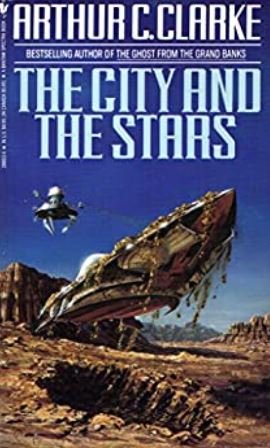#28 The City and the Stars by Arthur C. Clarke
I gave a lot of thought as i was shuffling through my books. This was written in 1956, but it is deceiving, as it was a rewrite of another story written in 1948 after WW2. Well-thought-out. It was never on my earlier lists, so it was an addition that came along later.
It takes place 2-3 billion years in the future. Humanity has left the planet millions of years in the past. The main City Diaspar is the home of Alvin. Diaspar is fully contained, no one leaves and no one returns. Machines repair and fix everything. Plus, it is machines that birth/clone all the new people.
The life cycle is unique. When you die, the computer stores your memories, then when a new clone is born it is allowed to grow and live. Parents are assigned, and until they become adults, watch over them. Then when they become adults they are given their former memories back, and continue their lives. This idea is passed on in another novel I love that will show up later in the list. However, I digress.
Alvin, is not like the other. Once every so often, a ‘unique’ is born. They have no former memories. This gives someone who does not have long memories. People that think differently into the community. The dreamers and thinkers outside the box. They don’t have millennia of likes, dislikes, prejudices.
Alvin wants to see outside. However, he is told by many they are locked here because humans went on a rampage, and were beaten back. Not being seen or going out is whey they are allowed to live. They must never explore space again or be destroyed, and has been translated to never leaving the city. he eventually find an underground subway that connected to other cities, that are mostly destroyed.
Well, he finds another long changed civilization, explores the planet, finds a robot guide. Then finds a ship. In the process, learning so much about his people and the word/galaxy we live in.
Like stranger in a strange land from Heinlein, this is a look into humanity. Where one is looking at someone from another planet (well kind of) trying to understand our world, religions, and passions, this book is where we might go. The fragmentation of humanity and where we may go. Then looking at that decadence and decay from the outside.
Heinlan and Clarke are, in my opinion, the two greats in sci-fi literature. Asimov might be better known, but i believe these two wrote better work. They are more soul-searching. I know they have some poor quality ones, every author seems to, but I love that it is not sci-fi just for action, or a story. This was an era where books were written to make us look at ourselves. Even that dark sides of ourselves.
